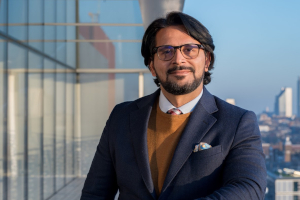Arabic Pasts: Histories and Historiographies
Research workshop
Co-hosted by the Aga Khan University, Institute for the Study of Muslim Civilisations and SOAS, University of London
6 to 8 October 2022
Aga Khan Centre, London & Online
This annual exploratory and informal workshop not only offers the opportunity to reflect on history writing in Arabic, but also invites contributors to explore more broadly how people relate to the past. We encourage contributions focused on methodologies, research agendas, and case studies related to Arabic in any region and in any period from the seventh century to the present.
Papers might elucidate questions such as:
-
How and in which terms do people refer to the past? How and in which terms do they refer to memory? What is the relation between history and memory, and between memory and space? How does the past sit in people’s bodies – and in the body politic?
-
Through what practices of writing or otherwise encoding the past and of remembering and forgetting, have different groups in the Middle East and North Africa viewed their pasts? At different times and places, was the significant past the same for court historians as for literary historians; for bureaucrats as for the military; for Sufis as for Muslim lawyers and Traditionists?
-
From what perspective have histories been written and what makes them coherent? How have past events been rendered intelligible? When do particular views of the past start to fall apart? Which categories and boundaries are seen as primordial and which are not? Which beings have been seen as capable of influencing events and when?
-
How do people connect the/their living and the/their dead conceptually? When are past events really over and when can they be laid to rest? Under which circumstances is the past revived? Why do some past lives or events inspire action and others do not? How does unresolved conflict inform thinking about and using the past?
-
How did non-Muslims and Muslims, men and women, adherents of different confessional or juristic traditions, or speakers of different languages, within societies that became “Islamic” imagine the shape and meaning of their specific societies’ own pasts, and their relation to the universal history of the Islamic community?
-
How have urban and rural people, workers and peasants, the religiously educated and the technocratic elite, developed different ways of writing, remembering, or commemorating particular events in, or the broad sweep of, local, national, or “Islamic” history?
-
In what ways do educational institutions, museums, media organizations and proponents of heritage use history writing in Arabic to shape loyalties and senses of belonging in the Middle East, North Africa, and Europe? How do recent discourses in the West shape discussions of history in the Middle East?
-
How can digital methods now enhance or change our understandings of the past? What additional information and perspectives do they offer? (How) do they limit our understanding? What are practical challenges when we apply digital methods to Arabic history? What seem to be particularly promising approaches?
Contributions are invited from scholars at all career levels, addressing any period and any part of the Middle East and North Africa, broadly defined.
This year we anticipate running the workshop from the Aga Centre in London, with the possibility to have an online component featuring participants who are unable to travel to the UK. As in past years, there is a small budget to provide some travel assistance for scholars outside of London.
Arabic Pasts is co-organized by Hugh Kennedy (SOAS), James McDougall (Oxford), Lorenz Nigst (AKU-ISMC), and Sarah Bowen Savant (AKU-ISMC).
Please submit an abstract of 300 words or less in word document by Tuesday, 19 April 2022 to ArabicPastsConf@aku.edu.
